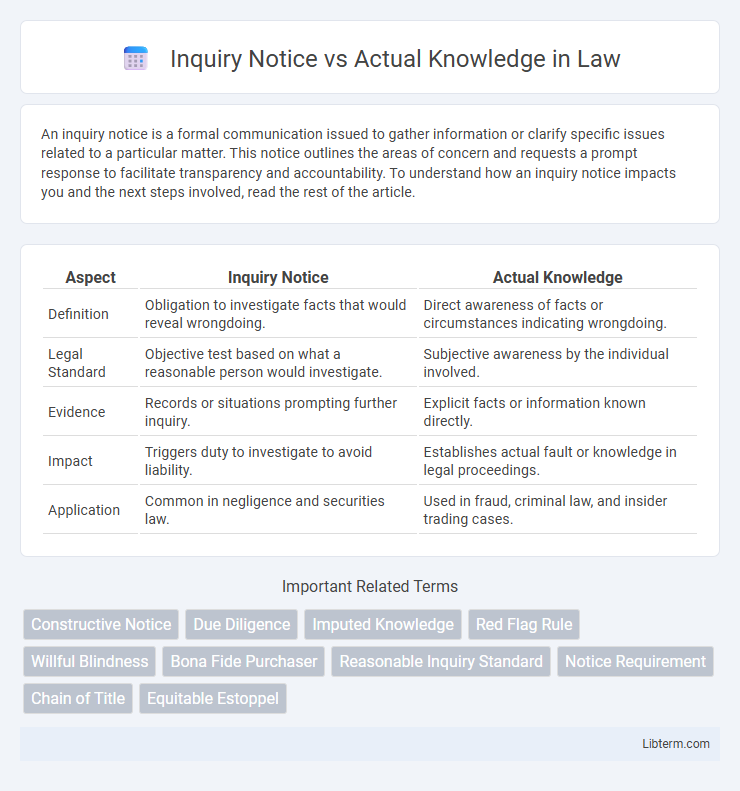An inquiry notice is a formal communication issued to gather information or clarify specific issues related to a particular matter. This notice outlines the areas of concern and requests a prompt response to facilitate transparency and accountability. To understand how an inquiry notice impacts you and the next steps involved, read the rest of the article.
Table of Comparison
| Aspect | Inquiry Notice | Actual Knowledge |
|---|---|---|
| Definition | Obligation to investigate facts that would reveal wrongdoing. | Direct awareness of facts or circumstances indicating wrongdoing. |
| Legal Standard | Objective test based on what a reasonable person would investigate. | Subjective awareness by the individual involved. |
| Evidence | Records or situations prompting further inquiry. | Explicit facts or information known directly. |
| Impact | Triggers duty to investigate to avoid liability. | Establishes actual fault or knowledge in legal proceedings. |
| Application | Common in negligence and securities law. | Used in fraud, criminal law, and insider trading cases. |
Understanding Inquiry Notice: Definition and Scope
Inquiry notice refers to the legal concept where a person is considered to have knowledge of facts that a reasonable investigation would reveal. It requires individuals to make reasonable inquiries when suspicious circumstances arise, thereby preventing willful ignorance. The scope of inquiry notice extends to all information that could be uncovered through diligent and timely investigation, holding parties accountable for knowledge they could have obtained with proper effort.
What Constitutes Actual Knowledge in Law
Actual knowledge in law refers to the direct and explicit awareness a person possesses about a fact or circumstance, often proven through evidence showing the individual had firsthand information or was unequivocally informed. Unlike inquiry notice, which suggests a duty to investigate upon receiving suspicious facts, actual knowledge requires clear, unmistakable recognition of the specific fact or legal issue. Courts often determine actual knowledge through documented communications, admissions, or unequivocal actions demonstrating the party's awareness of critical legal details.
Key Differences Between Inquiry Notice and Actual Knowledge
Inquiry notice requires a person to investigate facts or circumstances that suggest a potential issue, signaling a duty to inquire further. Actual knowledge means a person has direct, clear, and unequivocal awareness of specific facts or information. The key difference lies in the level of awareness: inquiry notice triggers an obligation to seek out information, while actual knowledge reflects confirmed and concrete understanding.
Legal Standards: How Courts Assess Each Concept
Courts distinguish between inquiry notice and actual knowledge by applying distinct legal standards; inquiry notice arises when circumstances would prompt a reasonable person to investigate further, establishing constructive knowledge, while actual knowledge requires proof that the party had explicit awareness of the fact or claim. Judicial assessments focus on whether facts were sufficiently evident to trigger a duty to inquire under inquiry notice, contrasting with demanding direct evidence to prove actual knowledge. This differentiation impacts statutes of limitations and equitable tolling, shaping how courts evaluate the timeliness and validity of claims.
Practical Examples: Inquiry Notice vs Actual Knowledge
Inquiry notice occurs when a party has enough information to reasonably investigate potential claims or issues, such as a bank suspecting fraudulent activity based on unusual account behavior but not having concrete proof. Actual knowledge means possessing direct, explicit awareness of a fact, like a landlord receiving a written complaint about hazardous living conditions from a tenant. Courts often differentiate these standards in liability cases, determining whether a party's awareness triggered a duty to act or investigate further.
The Importance of Diligence in Acquiring Knowledge
Diligence in acquiring knowledge is critical when distinguishing between inquiry notice and actual knowledge, as it determines legal responsibility and due diligence standards. Inquiry notice requires a party to investigate further upon discovering suspicious facts, while actual knowledge involves confirmed awareness of specific information. Ensuring thorough investigation and verification processes prevents legal liabilities and supports informed decision-making.
Common Legal Scenarios Involving Inquiry Notice
Inquiry notice arises when facts or circumstances prompt a reasonable person to investigate further, triggering legal obligations to discover relevant information. In property law, common scenarios include suspicious titles or unusual property conditions that put a potential buyer on inquiry notice of possible defects or claims. Courts often hold parties accountable for failing to act on inquiry notice, equating it to actual knowledge in litigation over ownership disputes or contractual breaches.
Consequences of Ignoring Inquiry Notice or Actual Knowledge
Ignoring inquiry notice or actual knowledge in legal and contractual matters often leads to severe consequences such as liability for damages and the inability to claim ignorance as a defense. Courts typically hold parties accountable once they have either actual knowledge or enough information to trigger inquiry notice, which requires further investigation. Failure to act on inquiry notice or actual knowledge can result in adverse judgments, including estoppel from denying claims or defenses related to the underlying facts.
Strategies for Proving or Disproving Knowledge in Court
Proving actual knowledge in court often relies on direct evidence such as witness testimony or documented communications indicating clear awareness of specific facts. Strategies to establish inquiry notice involve demonstrating that a reasonable investigation would have revealed critical information, typically through circumstantial evidence like suspicious circumstances or failure to act on obvious signs. Defense approaches frequently focus on disproving inquiry notice by highlighting gaps in information or reasonable lack of access, while challenging actual knowledge entails questioning the credibility or existence of explicit evidence.
Best Practices for Risk Management and Compliance
Inquiry Notice requires entities to investigate potential issues upon receiving information that would prompt a reasonable inquiry, while Actual Knowledge is based on direct awareness of facts or violations. Best practices for risk management and compliance involve implementing comprehensive training programs, maintaining thorough documentation, and conducting regular audits to identify red flags promptly. Establishing clear protocols for escalating inquiries ensures timely responses, reducing legal exposure and enhancing regulatory adherence.
Inquiry Notice Infographic

 libterm.com
libterm.com